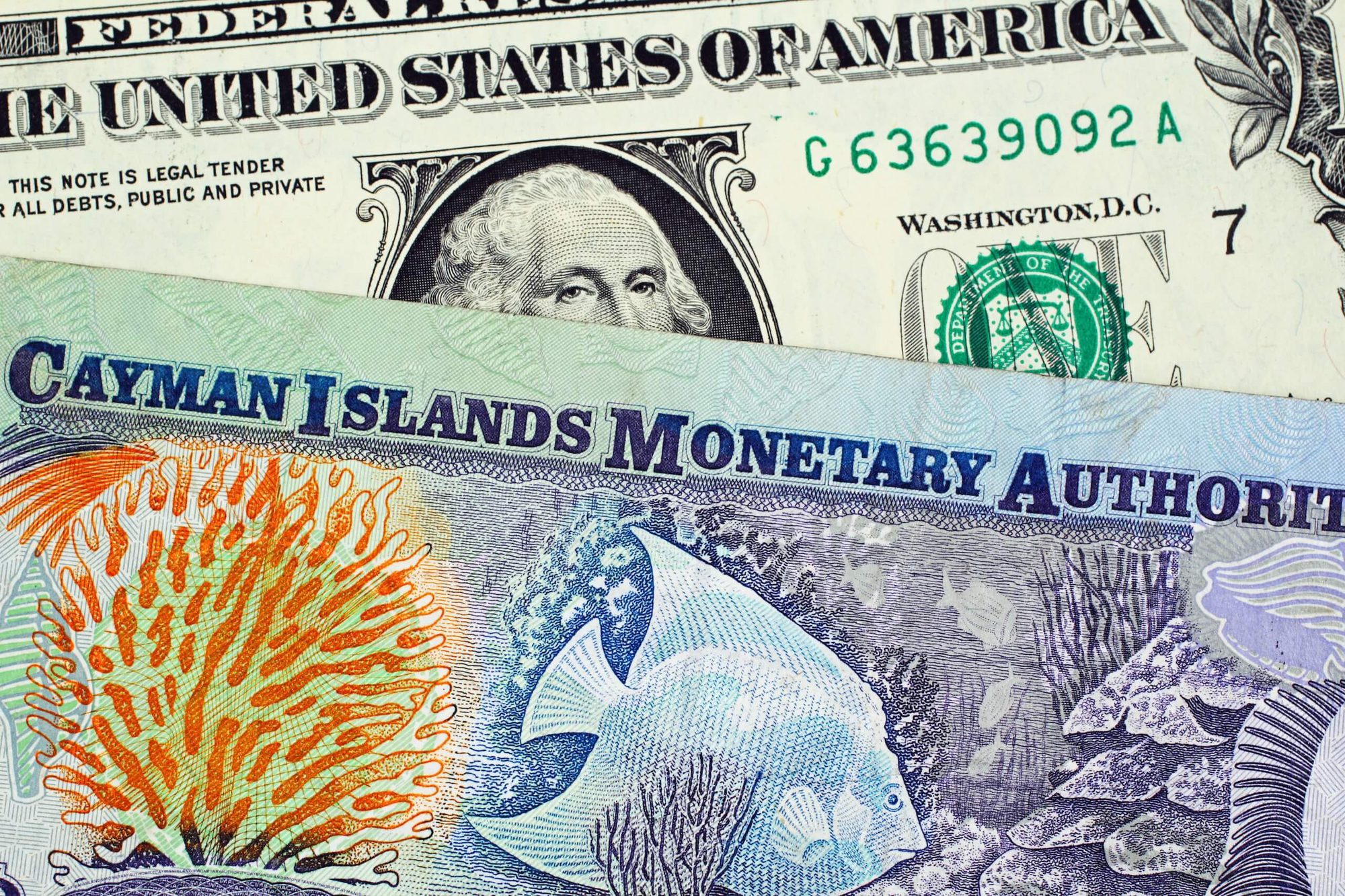
Money, Banking and Taxes
Cayman's banking system, our currency and why we don't have direct taxation.


The official currency of the Cayman Islands is the CI dollar (KYD). The exchange rate is tied to the US dollar with CI$1 being equivalent to US$1.25.
Cayman's Currency
CI dollars are issued in denominations of $1, $5, $10, $25, $50 and $100. US dollars are also widely accepted but you will probably receive change in KYD. Most stores, restaurants and resorts accept credit cards but do check first. Credit cards are always charged in US$.
ATMs can be found throughout the islands at all bank branches and also at major supermarkets. Be aware that in Little Cayman there is just one bank and it is not open every day so make sure you have enough cash to see you through.
CI to USD Conversion Table
| CI | US |
|---|---|
| $1 | $1.25 |
| $5 | $6.25 |
| $10 | $12.50 |
| $25 | $31.25 |
| $100 | $125 |
USD to CI Conversion Table
| US | CI |
|---|---|
| $1 | $.80 |
| $5 | $4 |
| $10 | $8 |
| $50 | $40 |
| $100 | $80 |
Taxes for Visitors
A government tourist tax of 10% will be added to your hotel bill unless you can prove you are a Cayman resident. Some hotels may also add a gratuity charge. There is no sales tax.
Tipping
If gratuities are not already included, it is customary to tip approximately 15% for good service and more if you were really impressed.
Cayman Banks
Regulated by the Cayman Islands Monetary Authority (CIMA), banking in the Cayman Islands is a major part of Cayman’s financial sector, with 79 banks (September 2025) licensed.
The banking sector hires highly skilled professionals and is one of the most prominent employers on the Island. Cayman Islands’ banks are bound by strict anti-money laundering laws, which together with Know-Your-Customer (KYC) regulations, are recognised as meeting or exceeding those of all major onshore jurisdictions.

The 79 banks licensed in Cayman are split into A and B classes, with the former licence permitting banks to carry out local and international business. There are currently 3 Class A licensed banks and 8 Class A bank & trusts in the Cayman Islands, with six out of that 11 carrying out retail services. The other 68 banks hold Class B licences and are mainly restricted to offshore transactions with non-residents. Of the current 79 banks licensed in Cayman, 9 are from Europe, 7 from the USA, 16 from the Caribbean and Central America, 13 from Asia and Australia, 10 from Canada and Mexico, 22 from South America and 2 from the Middle East and Africa. To see a list of the banks licensed in the Cayman Islands visit www.cima.ky.
State of the Cayman Island's Government Financial Position (September 2025)
Total Bank Balances: $392.8 million
- $93.0M in cash and short-term deposits (maturing within 90 days).
- $299.8M in fixed deposits maturing within one year.
- The government continues using fixed deposits because of high cash balances.
Overall Financial Performance
Operating Surplus
- Entire Public Sector (EPS): $137.4M surplus — $36.6M above budget.
- Core Government: $119.3M surplus.
Revenues: $970.4 million
- $56.0M above budget.
- Driven mainly by:
- Higher-than-expected financial services fees (exempt companies, partnerships, private funds).
- Stronger stamp duty revenue from property sales.
Expenses: $851.1 million
- $39.1M over budget.
- Overspending caused by:
- Higher costs for services from non-government providers (especially overseas tertiary healthcare).
- Increased transfer payments such as financial assistance and scholarships.
Outlook
- The government remains optimistic about full-year 2025 financial results.
- However, the Q4 surplus is expected to drop, due to planned increases in operating and capital spending.
You can get a more detailed analysis by visiting the CI Government website.
International Investment Position Summary
As of December 2024, banks reported US$320.8 billion in international assets and US$321.5 billion in international liabilities. This is lower than December 2023, when assets were US$382.7 billion and liabilities were US$373.5 billion.
Based on the value of cross-border activity, the Cayman Islands is now ranked:
- 20th in the world for cross-border assets at US$306.2 billion (December 2023: US$368.9 billion)
- 23rd for cross-border liabilities at US$266.2 billion (December 2023: US$331.7 billion)
These rankings show the Cayman Islands’ continued role as an international financial center.
Among the 79 banks operating as of December 2024, US$14.6 billion in assets and US$55.3 billion in liabilities were recorded within the domestic economy with other licensed resident entities.
For quarterly data, see the LBS Survey Results
Trade Deficit
Trading of Goods with the UK:
Total trade in goods and services between the UK and the Cayman Islands reached £5.2 billion in the year up to Q2 2025. This was an increase of £221 million (4.4%) compared with the year up to Q2 2024.
Out of the £5.2 billion total:
- UK exports to the Cayman Islands were £5.0 billion, which is £533 million (11.9%) higher than the previous year.
- UK imports from the Cayman Islands were £219 million, which is £312 million (58.8%) lower than the previous year.
Trading of Goods with the US:
Trade Balance
- Exports (U.S. → Cayman Islands): $88.8M
- Imports (U.S. ← Cayman Islands): $2.49M
- Overall Trade Balance: +$86.3M in favour of the United States.
Year-on-Year Change (Aug 2024 → Aug 2025)
- Exports decreased by $19.7M (-18.2%), from $108M to $88.8M.
- Imports increased by $270k (+12.2%), from $2.22M to $2.49M.
Top U.S. Exports to the Cayman Islands (August 2025)
- Commodities not elsewhere specified – $20.6M
- Refined Petroleum – $13.2M
- Cars – $3.01M
Top U.S. Imports from the Cayman Islands (August 2025)
- Telephones – $1.01M
- Commodities not elsewhere specified – $948k
- Precious Metal Scraps – $174k
New Beneficial Ownership Transparency Regulations
New Beneficial Ownership Transparency Regulations, approved by parliament in November 2024, allow journalists, researchers, non-profits, and other businesses to access beneficial ownership company information previously restricted to law enforcement. Access will be granted only for purposes related to combating money laundering, related crimes, or terrorism financing.
These new regulations derive in part from Cayman's 2019 commitment to the UK to adopt a public register of the beneficial ownership of private companies, which at the time was the international standard. That requirement however, was subsequently found to be in violation of certain rights to privacy by the European Courts of Justice in 2022.
Developed in consultation with constitutional expert Sir Jeffrey Jowell KC, the regulations aim to balance transparency and privacy while still meeting international standards. They are intended to uphold the Cayman Islands' financial reputation ahead of any future assessments by the Financial Action Task Force (FATF).
Removal from FATF
The Cayman Islands has successfully exited the Financial Action Task Force's (FATF) money laundering 'grey list' after more than two years of dedicated efforts. This significant accomplishment, announced on October 27th, 2023, follows a constructive meeting of the FATF Plenary in Paris. The 'grey list' classification is reserved for nations actively addressing deficiencies in anti-money laundering, terrorist financing, and proliferation financing measures. To align with global standards, the Cayman Islands established a new police unit, enacted legislative changes, and implemented updated standards for realtors and precious metal dealers.
This removal holds importance for the Islands' financial services industry, reaffirming their commitment to combatting financial crimes and creating a favorable environment for foreign investment. Notably, the Cayman Islands now proudly stands on the 'White List,' reflecting their success in addressing regulatory concerns, which bodes well for the finance industry's future in Cayman. As of December 2023, the jurisdiction is now undergoing removal from additional entities' listings associated with AML/CFT/CPF policies. The CI Government has already received notification of the EU Commission's issuance of a delegated regulation, specifically addressing the delisting of the Cayman Islands from its AML black-list and the Islands have also been officially removed from the UK's AML list, as of early December 2023.
Taxation in the Cayman Islands
It has been suggested unofficially, that a tax haven is somewhere that has little or no taxation, protects personal financial information through laws blocking the sharing of information and exhibits an obvious lack of transparency. Although the Cayman Islands are often referred to as a ‘tax haven’, this does not mean it is an uncooperative jurisdiction with regards to tax matters or other criminal matters.
Indeed, the Cayman Islands have been making large efforts to be transparent and to sign laws that benefit foreign governments in the sharing of information and this has paid dividends. In 2000, the Cayman Islands Government signed up to the OECD’s project to eliminate harmful tax practices and join the Global Forum on Taxation. In 2001, as a demonstration of the OECD commitment, the Cayman Islands signed a tax information exchange agreement with the US which is in force for all civil and criminal matters. A few years later, the Cayman Islands agreed to implement the European Union Savings Directive, automatically reporting bilaterally to each of the 27 EU member states the interest income earned by EU citizens in Cayman Islands bank accounts.
Since then the Cayman Islands have also signed numerous tax information exchange agreements with G-20 and/or OECD countries modelled on the OECD standard for bilateral tax information exchange and continues to actively negotiate additional agreements. Furthermore, the Cayman Islands has pioneered a unilateral mechanism, which provides for precisely the same range of tax information exchange in relation to tax information matters without a bilateral treaty and thereby provides access to a further 22 countries including the United Kingdom, Japan, India, South Africa and Germany among others.
The willingness of the Cayman Islands to be an open and cooperative jurisdiction resulting in it being added to the OECD ‘white list’ perhaps demonstrates that the label ‘tax haven’ is somewhat outdated and simply unfair. The professional service providers based in the Cayman Islands prefer (in recognition of the efforts undertaken) that a modern term of being a ‘tax neutral jurisdiction’ be used.
These efforts on the part of the Cayman Islands have been rewarded by an increase in transactional flows; this is no doubt because of the institutional business which was attracted to the Cayman Islands as a result of its tax neutrality and its improved reputation internationally as a cooperative financial jurisdiction.




